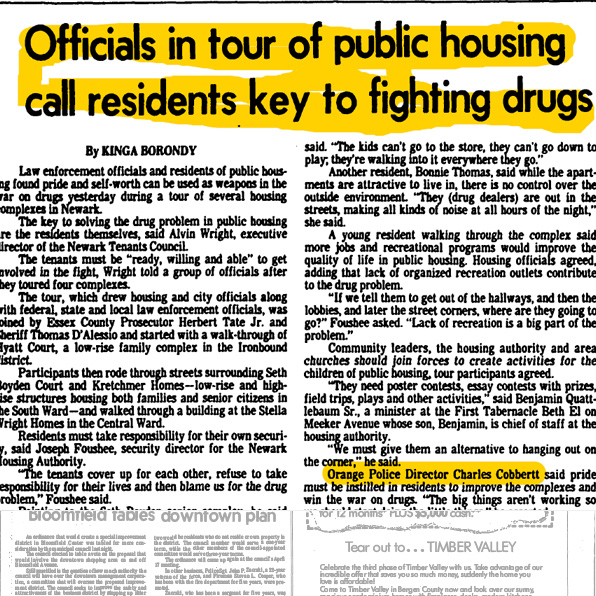Law enforcement officials and residents of public housing found pride and self-worth can be used as weapons in the war on drugs yesterday during a tour of several housing complexes in Newark.
The keys to solving the drug problem in public housing are the residents themselves, said Alvin Wright, executive director of the Newark Tenants Council.
The tenants must be "ready, willing and able" to get involved in the fight, Wright told a group of officials after they toured four complexes.

The tour, which drew housing and city officials along with federal, state and local law enforcement officials was joined by Essex County Prosecutor Herbert Tate Jr. and Sheriff Thomas D'Alessio and started with a walk-through of Hyatt Court, a low-rise family complex in the Ironbound district.
Participants then rode through streets surrounding Seth Boyden Court and Kretchmer Homes - low-rise and high-rise structures housing both families and senior citizens in the South Ward - and walked through a building at the Stella Wright Homes in the Central Ward.
Residents must take responsibility for their own security, said Joseph Foushee, security director for the Newark Housing Authority.
"The tenants cover up for each other, refuse to take responsibility for their lives and then blame us for the drug problem," Foushee said.
Pointing to the Seth Boyden senior complex, he said security there is hampered by young adults living clandestinely with older relatives.
Later, on observing a maze of blacktop that leads through the Hyatt Court complex, Foushee said, "There's no question that the architecture and layout of the buildings are not conducive to good security. It seems as if the projects act as a magnet, prommising anonymity."
Public housing residents echoed some of the concerns of law enforcement officials. Doris Daniels, a resident of Hyatt Court and a teacher at a neighborhood pre-school, described some of the problems caused by drug abuse.
"There are shootings, staggings and fights," Daniels said. "The kids can't go to the store, they can't go down to play; they're walking into it everywhere they go."
Another resident, Bonnie Thomas, said while the apartments are attactive to live in, there is no control over the outside environment. "They (drug dealers) are out in the streets, making all kinds of noise at all hours of the night," she said.
A young resident walking though the complex said more jobs and recreational programs would improve the quality of life in public housing. Housing officials agreed, adding that lack of organized recreation outlets contribute to the drug problem.
"If we tell them to get out of the hallways, and then the tobbies, and later the street corners, where are they going to go?" Foushee asked. "Lack of recreation is a big part of the problem."
Community leaders, the housing authority and area churches should join forces to create activities for the children of public housing, tour participants agreed.
"They need poster contests, essay contests with prizes, field trips, plays and other activities," said Benjamin Quattlebaum Sr., a minister at the First Tabernacle Beth El on Meeker Avenue whose son, Benjamin, is chief of staff at the housing authority.
"We must give them an alternative to hanging out on the corner," he said.
Orange Police Director Charles Cobbertt said pride must be instilled in residents to improve the complexes and win the war on drugs. "The big things aren't working so we should start doing the little things," he asserted.
If youngsters help pick up papers, cans and garbage around their neighborhoods they may think twice about throwing trash on the street themselves, Cobbertt said. If the children help clean, they may resent outsiders dumping on their neighborhoods and tell them to clean up after themselves.
Cobbertt also urged people to change the labels placed on public housing developments.
"Don't call them projects, call them housing complexes," Cobbertt said, adding that names can mean a lot.
Cobbertt said his city seems to be winning the war on drugs at housing developments in stages.
The first of three stages he outlined included drug sweeps of the buildings and numerous arrests. Cobbertt said the second stage, now in effect, calls for police assigned to the complex to meet with residents and tell them that "The ball is in their backyard now; it's up to them."
The third stage, which will be implemented when the city obtains more manpower, calls for the assignment of police officers to each complex on a regular basis. Cobbertt said in that way the residents may come to trust the officers more.
Cobbertt said he hopes to eradicate the idea of police as robots and enemies. "We're not big bad animals." he said.
“Reach Back with One Hand and Pull Someone Else Up With You.”
– Charles C. Cobbertt
Explore more of the inspiring stories of Charles C. Cobbertt.